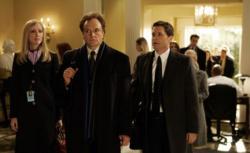Last week in Slate, I wrote a Completist about the work of Aaron Sorkin, from his first produced play (a one-act called Hidden in this Picture, from 1988) to the first four episodes of The Newsroom. It is Completist tradition to rank the work of the artist in question, but with Sorkin this proved tricky. How do you compare a TV series to a film? How do you weigh Sorkin’s contribution to a movie against the director’s? Is The Social Network better than A Few Good Men because Sorkin wrote a better script or because David Fincher is a more interesting director than Rob Reiner? (The latter, I’d argue.)
Since TV is the quintessential Sorkin medium, I’ve decided to list the ten best episodes from his four TV series. It’s quite possible this list should come entirely from The West Wing, but that would be boring. (Plus, after choosing my favorite seven episodes from that show, it became nearly impossible to settle on which would come next.) And I do think the episodes below from his other shows—including, yes, The Newsroom—stand with some of his better West Wing work.
So, without further ado, the ten best episodes of television written by Aaron Sorkin:
“In the Shadow of Two Gunmen, Parts 1 & 2”
This may be heretical for West Wing diehards, but I always tell those new to the show to skip Season 1 and start here. It introduces the major characters in expertly done flashbacks (The West Wing was great at flashbacks), showing us how they all came together and why they’ve gone into politics.
I described this one at some length in the Completist. The episode seamlessly weaves together several gripping plotlines and has some of Sorkin’s best lines (like “In the future, if you’re wondering, ‘Crime… boy, I don’t know’ is when I decided to kick your ass”).
In addition to having an excellent main cast, The West Wing had several great recurring characters. Among the very best is Stanley Keyworth, a psychotherapist who works for the American Trauma Victims Association. Played brilliantly by Adam Arkin, Keyworth is one of the few characters allowed to outsmart the very smart main characters (in this case, Josh Lyman, who is in denial about how shaken up he still is by the assassination attempt that ended Season 1).
Aaron Sorkin occasionally gets knocked as a sexist, and not entirely without reason. But The West Wing had some great female characters, including C.J. Cregg, Abigail Bartlet (the First Lady), and Amy Gardner. In this episode, those three sneak out of the First Lady’s formal birthday party celebration to get drunk together. It’s terrific. (Also terrific: the tête-à-tête between Toby Ziegler, probably the show’s best character, and Lord John Marbury, another delightful recurring one, played by Roger Rees.)
The best character in Sports Night is Dan Rydell—played by Josh Charles and supposedly based on Keith Olbermann—and “Eli’s Coming” is the best Rydell-centric episode. It helps that the episode is slightly less dependent than most of Sports Night on characters repeating what other characters say, a Sorkin tic that is so common on the series as to occasionally render the otherwise mostly pleasant show almost unwatchable.
Sure, the series went off the rails almost immediately and its greatest creative legacy is a collection of unofficial Twitter feeds launched years after it was canceled. It still got off to a great start.
Before Connie Britton won the hearts of right-feeling people everywhere by playing Tami Taylor on Friday Night Lights, she tried to help the Bartlet team get reelected. The West Wing was often at its best when the administration was being frankly calculating, and rarely better than in this episode, which, once again, includes some good West Wing flashbacks.
Sorkin’s final episode before the left the show is a barn-burner in which the president’s daughter gets kidnapped. It ends with the perfectly timed arrival of John Goodman as a belligerent Republican Speaker of the House who takes over the reins from the President until his daughter is recovered. Is the plot over-the-top? Of course. But it’s excellently done.
This episode goes over-the-top in a very different way: At one point, President Bartlet, angry about the death of his longtime secretary, screams at God in Latin. It’s a bit much, obviously, but I enjoy the out-sized ambition of it. And if you ever doubted that President Bartlet is less an American president and more a Shakespearean king that the show pretends is an American president, this episode will put your doubts to rest.
“We Just Decided To,” The Newsroom
If your Twitter feed is anything like mine, and you were reading it between 10 p.m. and 11 p.m. last night, then you have already read enough scorn and derision directed at The Newsroom to last the entire first season. Which is surprising, since the first episode is actually quite good. Sure, it’s nearly identical to the pilot of Studio 60, with a few added helpings of Sports Night. And no, Walter Cronkite didn’t end the Vietnam War. Even so, Sorkin does the “everyone comes together and pulls off the seemingly impossible” like no one else. (And if you didn’t watch the show last night, you can watch it for free on YouTube.)
